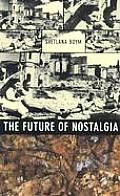Recently Read: The Future of Nostalgia
September 14, 2008
 In The Future of Nostalgia, Svetlana Boym introduces several interesting theories regarding both the history and future of nostalgia. She distinguishes between restorative and reflective nostalgia, explaining that restorative nostalgia works on the assumption of a past “truth” and the goal of re-instating that past. Alternatively, reflective nostalgia deals with the feeling of longing and loss associated with nostalgia but does not actually try to recapture the past. The word nostalgia, Boym explains, is from the Greek “nostros” or home and algia or “longing.” Restorative nostalgia then is a desire to rebuild and return to this home, whereas reflective nostalgia is a constant deferral of a homecoming, incorporating the enjoyment of the distance between past and present, which savors the inability of return.
In The Future of Nostalgia, Svetlana Boym introduces several interesting theories regarding both the history and future of nostalgia. She distinguishes between restorative and reflective nostalgia, explaining that restorative nostalgia works on the assumption of a past “truth” and the goal of re-instating that past. Alternatively, reflective nostalgia deals with the feeling of longing and loss associated with nostalgia but does not actually try to recapture the past. The word nostalgia, Boym explains, is from the Greek “nostros” or home and algia or “longing.” Restorative nostalgia then is a desire to rebuild and return to this home, whereas reflective nostalgia is a constant deferral of a homecoming, incorporating the enjoyment of the distance between past and present, which savors the inability of return.
Early in the book, Boym introduces the concept of “off-modern,” explaining that the adverb “off” focuses our attention on a non-linear exploration of time and space. As opposed to the suffix “post,” it does not suggest a linear idea of progress, allowing for detours and roadblocks to be embraced and explored. By focusing on several different cities including Moscow, St. Petersburg and Berlin, the reader gets a sense that the exploration of nostalgia is one that traverses both space and time, a journey beyond physical borders. Boym’s explorations of these cities are often introduced through her own experiences there. She successfully integrates her own personal experiences in these cities-in-transition with larger political and cultural narratives of nostalgia.